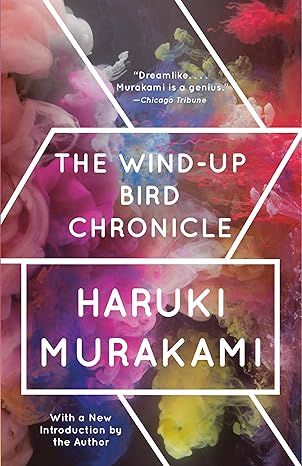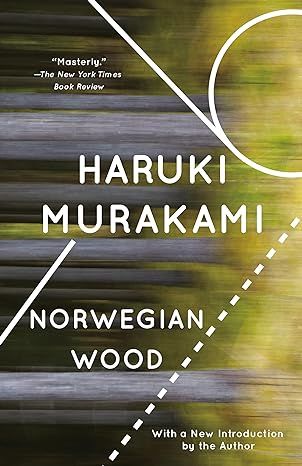The Wind-Up Bird Chronicle: A Novel
4.4
-
10,205 ratings
A "dreamlike and compelling” tour de force (Chicago Tribune)—an astonishingly imaginative detective story, an account of a disintegrating marriage, and an excavation of the buried secrets from Japan’s forgotten campaign in Manchuria during World War II.
Now with a new introduction by the author.
In a Tokyo suburb, a young man named Toru Okada searches for his wife’s missing cat—and then for his wife as well—in a netherworld beneath the city’s placid surface. As these searches intersect, he encounters a bizarre group of allies and antagonists. Gripping, prophetic, and suffused with comedy and menace, this is one of Haruki Murakami’s most acclaimed and beloved novels.
Kindle
$13.99
Available instantly
Audiobook
$0.00
with membership trial
Hardcover
$22.32
Paperback
$14.99
Ships from
Amazon.com
Payment
Secure transaction
ISBN-10
0679775439
ISBN-13
978-0679775430
Print length
607 pages
Language
English
Publisher
Vintage
Publication date
August 31, 1998
Dimensions
5.2 x 1.3 x 8.01 inches
Item weight
15.6 ounces
Popular Highlights in this book
You’ve got to spend your money for the things that money can buy, not worry about profit or loss. Save your energy for the things that money can’t buy.
Highlighted by 2,337 Kindle readers
The passage of time will usually extract the venom from most things and render them harmless. Then, sooner or later, I forget about them.
Highlighted by 2,134 Kindle readers
The relief this gave me bordered on ecstasy. Nothing so consumes a person as meaningless exertion.
Highlighted by 848 Kindle readers
You’ve got to spend your money for the things that money can buy, not worry about profit or loss. Save your energy for the things that money can’t buy.
Highlighted by 582 Kindle readers
Product details
ASIN :
B003XT605Y
File size :
4792 KB
Text-to-speech :
Enabled
Screen reader :
Supported
Enhanced typesetting :
Enabled
X-Ray :
Enabled
Word wise :
Enabled
Editorial Reviews
“Dreamlike and compelling.... Murakami is a genius.” —Chicago Tribune
“Mesmerizing.... Murakami’s most ambitious attempt yet to stuff all of modern Japan into a single fictional edifice.” —The Washington Post Book World
“A significant advance in Murakami’s art ... a bold and generous book.” —The New York Times Book Review
“A stunning work of art ... that bears no comparisons.” —New York Observer
“With The Wind-Up Bird Chronicle, Murakami spreads his brilliant, fantastical wings and soars.” —Philadelphia Inquirer
“Seductive.... A labyrinth designed by a master, at once familiar and irresistibly strange.” —San Francisco Chronicle
“An epic ... as sculpted and implacable as a bird by Brancusi.” —New York Magazine
“Mesmerizing, original ... fascinating, daring, mysterious and profoundly rewarding.” —Baltimore Sun
“A beguiling sense of mystery suffuses The Wind-Up Bird Chronicle and draws us irresistibly and ever deeper into the phantasmagoria of pain and memory.... Compelling [and] convincing.” —Los Angeles Times Book Review
“Digs relentlessly into the buried secrets of Japan’s past ... brilliantly translated into the latest vernacular.” —Pico Iyer, Time
Sample
1
Tuesday’s Wind-Up Bird
Six Fingers and Four Breasts
When the phone rang I was in the kitchen, boiling a potrul of spaghetti and whistling along with an FM broadcast of the overture to Rossini’s The Thieving Magpie, which has to be the perfect music for cooking pasta.
I wanted to ignore the phone, not only because the spaghetti was nearly done, but because Claudio Abbado was bringing the London Symphony to its musical climax. Finally, though, I had to give in. It could have been somebody with news of a job opening. I lowered the flame, went to the living room, and picked up the receiver.
“Ten minutes, please,” said a woman on the other end.
I’m good at recognizing people’s voices, but this was not one I knew.
“Excuse me? To whom did you wish to speak?”
“To you, of course. Ten minutes, please. That’s all we need to understand each other.” Her voice was low and soft but otherwise nondescript.
“Understand each other?”
“Each other’s feelings.”
I leaned over and peeked through the kitchen door. The spaghetti pot was steaming nicely, and Claudio Abbado was still conducting The Thieving Magpie.
“Sorry, but you caught me in the middle of making spaghetti. Can I ask you to call back later?”
“Spaghetti!? What are you doing cooking spaghetti at ten-thirty in the morning?”
“That’s none of your business,” I said. “I decide what I eat and when I eat it.”
“True enough. I’ll call back,” she said, her voice now flat and expressionless. A little change in mood can do amazing things to the tone of a person’s voice.
“Hold on a minute,” I said before she could hang up. “If this is some new sales gimmick, you can forget it. I’m out of work. I’m not in the market for anything.”
“Don’t worry. I know.”
“You know? You know what?”
“That you’re out of work. I know about that. So go cook your precious spaghetti.”
“Who the hell-”
She cut the connection.
With no outlet for my feelings, I stared at the phone in my hand until I remembered the spaghetti. Back in the kitchen, I turned off the gas and poured the contents of the pot into a colander. Thanks to the phone call, the spaghetti was a little softer than al dente, but it had not been dealt a mortal blow. I started eating-and thinking.
Understand each other? Understand each other’s feelings in ten minutes? What was she talking about? Maybe it was just a prank call. Or some new sales pitch. In any case, it had nothing to do with me.
After lunch, I went back to my library novel on the living room sofa, glancing every now and then at the telephone. What were we supposed to understand about each other in ten minutes? What can two people understand about each other in ten minutes? Come to think of it, she seemed awfully sure about those ten minutes: it was the first thing out of her mouth. As if nine minutes would be too short or eleven minutes too long. Like cooking spaghetti al dente.
I couldn’t read anymore. I decided to iron shirts instead. Which is what I always do when I’m upset. It’s an old habit. I divide the job into twelve precise stages, beginning with the collar (outer surface) and ending with the left-hand cuff. The order is always the same, and I count off each stage to myself. Otherwise, it won’t come out right.
I ironed three shirts, checking them over for wrinkles and putting them on hangers. Once I had switched off the iron and put it away with the ironing board in the hall closet, my mind felt a good deal clearer.
I was on my way to the kitchen for a glass of water when the phone rang again. I hesitated for a second but decided to answer it. If it was the same woman, I’d tell her I was ironing and hang up.
This time it was Kumiko. The wall clock said eleven-thirty. “How are you?” she asked.
“Fine,” I said, relieved to hear my wife’s voice.
“What are you doing?”
“Just finished ironing.”
“What’s wrong?” There was a note of tension in her voice. She knew what it meant for me to be ironing.
“Nothing. I was just ironing some shirts.” I sat down and shifted the receiver from my left hand to my right. “What’s up?”
“Can you write poetry?” she asked.
“Poetry!?” Poetry? Did she mean ... poetry?
“I know the publisher of a story magazine for girls. They’re looking for somebody to pick and revise poems submitted by readers. And they want the person to write a short poem every month for the frontispiece. Pay’s not bad for an easy job. Of course, it’s part-time. But they might add some editorial work if the person-”
“Easy work?” I broke in. “Hey, wait a minute. I’m looking for something in law, not poetry.”
“I thought you did some writing in high school.”
“Yeah, sure, for the school newspaper: which team won the soccer championship or how the physics teacher fell down the stairs and ended up in the hospital-that kind of stuff. Not poetry. I can’t write poetry.”
“Sure, but I’m not talking about great poetry, just something for high school girls. It doesn’t have to find a place in literary history. You could do it with your eyes closed. Don’t you see?”
“Look, I just can’t write poetry-eyes open or closed. I’ve never done it, and I’m not going to start now.”
Read more
About the authors
Haruki Murakami
Haruki Murakami was born in Kyoto in 1949 and now lives near Tokyo. His work has been translated into more than fifty languages, and the most recent of his many international honors is the Jerusalem Prize, whose previous recipients include J. M. Coetzee, Milan Kundera, and V. S. Naipaul.
Reviews
Customer reviews
4.4 out of 5
10,205 global ratings
fra7299
5
"For heaven's sake, Mr. Wind Up Bird, why can't you ever get involved with people who are a little more normal?"
Reviewed in the United States on December 14, 2013
Verified Purchase
The Wind Up Bird Chronicle centers around the story of Toru Okada (Mr. Wind Up Bird), a thirty-something everyman who has decided to give up his job. Satisfied with waiting for the right job opportunity, Okada has settled in to staying at home and doing chores, and looking for his lost cat. When Okada’s wife Kumiko suddenly leaves him, he goes on a quest to discover her whereabouts and try to understand why she has gone. Believing Kumiko’s corrupt politician brother may be responsible, he searches for answers. Along the way he meets a sixteen year old girl, May, who is obsessed with death, and shows him a mysterious well in a neighboring yard. When he decides to go to the bottom of the well to think, Okada discovers that he may have opened a portal to another realm. Through Okada’s search for meaning, through a series of odd episodes and events, he comes in contact with several eccentric types: psychic sisters (Malta and Creta), a former military man (Torkutaro Mamiya), a fashion designer (Nutmeg) and her mute son (Cinnamon).
One amazing aspect to this novel is simply the narrative and level of storytelling. There are so many moments and events that take on symbolic meaning. There’s a mystical, dream-like quality to much of the novel, but these moments serve to be the basis for powerful revelations. On the surface, Okada has a physical search for his wife and cat, but there is a deeper level of philosophy and also a spiritual search for life’s answers. Within the novel, there are elements of good and evil, both coming in the form of characters and events.
The author also uses correspondence as a way of moving the plot forward or filling in key moments. In particular, Mr. Mamiya’s account of the terrible events in the war was powerful, yet brutal and awful, yet it serves to give Okada some insight into the past. Kumiko’s letters have an ambiguous feel to them, but attempt to fill in the gaps. Even with rather violent and bizarre moments, The Wind Up Bird Chronicle comes back to a humanistic approach that reveals a moral or significance.
Haruki Murakami’s The Wind Up Bird Chronicle compels you think about life, existence, meaning, love, and the human element. As with Hard Boiled Wonderland, The Wind Up Bird Chronicle has a fragmented way about it: miscellaneous parts, eccentric characters moving in and out, and a distorted picture of time and place. All these create a system of meaning. Deeply symbolic elements are within the plot structure. Out of so much chaos and confusion comes understanding. Many authors that attempt this sort of fantasy/reality structure fail miserably, or may have their novels come across as gimmicky, but Murakami handles the bizarre, the philosophical, dream-like aspects so aptly that you are pulled in.
Read more
6 people found this helpful
Mahima
5
A Milestone of Narrative Majesty
Reviewed in the United States on October 20, 2013
Verified Purchase
The fiction, the fame and the personality of Haruki Murakami constitute an unprecedented triumph of contemporary literature for all of us to cherish and honor around the world. Devoted to a narrative poetics of a dream of another logic of existence, Murakami embodies a splendor of re-imagining audacity that is distinctly of the highest achievement of the artistic sensibility of our times. Murakami's body of texts is an epic dream of defamiliarizing storytelling of displacement of consciousness beyond waking life and known finalities.
An assault of art and soul in a colossal ambition of meaning, The Wind-Up Bird Chronicle is a towering performance of narrative consolation that can only be read in a trance as a text of bliss. Every chapter of the 3 Books and 68 Chapters of The Wind-Up Bird Chronicle is a shuffling shade of a visionary dream in a dazzling palette of gnosis of a storyteller as seer. The story of a failed marriage is spun in breathtaking narrative invention as a surreal extravaganza of human fate in a gorgeous pastiche of voices, styles and genres panning human meaning from the gross to the sublime. Written by the only writer in the history of literature who is also a marathon runner, The Wind-Up Bird Chronicle is nothing short of a narrative marathon of total genius that cuts the ribbon of enlightenment.
The cat of Toru Okada's wife Kumiko disappears in the opening pages of The Wind-Up Bird Chronicle and a search for the cat ensues that turns into a phantasmagoria of unsettlement of consciousness in eerie occurrences of borderless mutation of dream and reality of 607 marvelous pages. An ordinary cat disappears and along with it ordinariness itself. From the mesmerizing story that Murakami tells us we may infer that in searching for what we lose we may recover more than we lost because in our search we had the courage like Toru to lose who we ordinarily are and find who we are at "the core."
In The Wind-Up Bird Chronicle, the world is a "defiled" place. "Defilement" is a foundational error of the human self being split into two by a diabolic "power." Every major character in The Wind-Up Bird Chronicle (Toru, Kumiko, Creta, Lieutenant Mamiya and Cinnamon) is differently split into two and differently searching for a lost wholeness. Noboru Wataya, the brother of Kumiko, personifies the sinister metastasis of "defilement" that spreads and invades as a glamorous "power" of seducing and splitting evil
A perplexed loser, Toru seems an Everyman whom Murakami selects to search for meaning deeply and literally in a "well" and surrounds with saviors of the soul like Mr. Honda, May Kashara, Lieutenant Mamiya and Nutmeg Akasaka and saves almost fully. The Wind-Up Bird Chronicle reads like a medieval Morality play retold as a contemporary magical allegory of a postmodern psychomachia. As it draws to a close after an epic spell of storytelling, The Wind-Up Bird Chronicle convinces us that it has told an ancient tale of the perils of the soul in an evil world and the ultimate victory of Good over Evil in a hypnotic surreal plot with real characters and magical action and mythical perfume that is the most imaginative narrative contemplation of human fate in our times. The story of Toru is a surreal edition with Murakami's idiosyncrasies of imagination, enchantment of craft and majesty of wisdom of the eternal story of Everyman. The Wind-Up Bird Chronicle is a secret almanac of the soul--the lost soul, the searching soul and the saved soul--as a postmodern magical novel of mad loveliness and aching wonder.
The act of reading The Wind-Up Bird Chronicle--moving from page to unfathomable page of an astonishing novel of voice after bewitching voice, mood after surprising mood, moment after mysterious moment and story after strange story of the encyclopedia of the human enigma--is its own incomparable meaning. However, if the reader cannot avoid asking at some point or the other of this fabulous script and the spell it casts what the writing and the reading of The Wind-Up Bird Chronicle amount to, the answer can only be that it is about the ultimate human search for Murakami and his reader: saving the soul--that it is what Murakami has done in the way he knows best as an author to save his soul: by telling a story at the deepest recesses of an esoteric imagination and what we as readers ought to do in the way we know best as readers to save our soul: by losing ourselves in saving grace in the form of a novel of the highest generosity of narrative wisdom and compassion in contemporary literature. I doubt if anyone can read The Wind-Up Bird Chronicle without choking in thanks for being saved in the magical opulence of imagination and wisdom and compassion of a transcendent novel of hell and heaven and the human soul by a storyteller as savior.
Read more
9 people found this helpful

Ti
5
A wildly imaginative work. Quite possibly the most interesting literary experience I've had. Ever.
Reviewed in the United States on May 20, 2013
Verified Purchase
If I had to sum this book up with one sentence, I'd say this:
Nothing, is as it seems.
Toru Okada is a normal guy. But when his cat goes missing, and then his wife Kumiko follows shortly thereafter, what at first seems normal suddenly becomes surreal and odd. So odd, that Toru apends time in an abandoned well to sort it all out.
In the mean time, he meets a cast of very strange characters:
*May Kasahara - a young neighbor girl who thinks about death a lot. She has a very matter-of-fact way of talking and acts as a sounding board for Toru.
*Noboru Wataya - the brother of Kumiko. Toru cannot stand him as his political ideals differ from his. He's also a bully when it comes to his sister Kumiko. The lost cat is also named after him, which is odd in and of itself given that Kumiko and Toru really do not like the guy.
*Lieutenant Mamiya - an officer who witnessed the brutal death of a another officer. He is scarred over that event and has spent his own time down in a well. He has been tasked with carrying out a request in a will which is what brings him to Toru.
*Malta Kano - acts as a medium. Kumiko hires her to help them find their cat. She sees things, but she's not all that clear when she translates it to those who need the information.
*Creta Kano - Creta is Malta's sister. She too, has a talent but her talent is unpracticed and involves inhabiting people's minds. She is also called a "prostitute of the mind" and gets to know Toru quite well.
*Nutmeg Akasaka - the businesswoman who first sees Toru while observing people in the city. She is attracted to the blue\black mark on his face. A mark that her father also bore many years ago. Later, she makes him a proposition that he finds hard to refuse.
*Cinammon Akasaka - the son of Nutmeg. He does not speak but uses a strange form of sign language to communicate. He carries out the wishes of his mother but is exceptionally good at what he does and what he does involves looking out for Toru on many levels.
*The Wind-Up Bird - a bird that only certain characters hear. This bird makes a screeching noise and when Toru hears it, he is immediately reminded of a spring and how it needs to be wound in order to keep the world going. If you pay attention while reading, the appearance of the bird can clue you in to what is going on at that point in time.
There isn't a right or wrong way to describe this book. The story is simple, but the things that happen within the story beg to be discussed. The personalities of the characters, their history and how they all play their own part in the story is what makes a Murakami book an "experience" more than just a good read. It's walks a crazy fine line between what's normal and what's not and throws in bits and pieces to shake you up and to jolt you back into reality, or what you think is reality. It's the type of book that will have you asking questions for days, but somehow Murakami manages to bring it all together by those last few pages. Not to say that your questions have been fully answered. No, can't say that. But I can say that as a reader, I was satisfied when I turned that last page.
Murakami's writing is very accessible and simple to follow. Most first-time readers feel intimidated by what they've heard about him, but the writing is not complex. The meaning behind what is written though, can boggle the mind, but not in a bad way. His books have a palate cleansing effect which I find very pleasing. He challenges you to think outside of the box and if you give in to it, usually you're rewarded with a positive reading experience. Usually. There are those that are completely turned off by the oddness of it, and I understand that too. Murakami is not for everyone but what a reading experience it is!
Reading this book was like taking two Benadryls, drinking a couple glasses of wine and then having one heck of a strange dream afterward. You wake, but you don't wake and you sort of like it that way.
As with his other novels, this book shares many of the same themes but mostly alienation and loneliness. There are some graphic depictions of sex and rape but not as much as some of his other novels. There is also a particularly gruesome act of violence but it's brief and not drawn out so I found it tolerable although some of the other readers in the read-along found it hard to read.
Compared to his other books, The Wind-Up Bird Chronicle is probably one of my favorites. It's right up there with Kafka on the Shore but I found it much easier to follow than Kafka. It's long. Over 600 pages long but much of it reads very quickly. In the six weeks that we had to finish the book, I think most finished well before the deadline. However, it was maybe 50 pages too long. I understand that two chapters were removed from the English translation and that they had to do with Toru's relationship with Creta. I know it would have made the book longer but I wish I had those chapters now.
If you are intrigued and want to give it a try, do so with an open mind and give yourself plenty of time to absorb what you've read. It also doesn't hurt to take a week or two when done to just ponder the story. I found it very hard to focus on other books after finishing Wind-Up.
Read more
60 people found this helpful
ET
4
Murakami’s Best Novel - But not the best he could have written
Reviewed in the United States on July 25, 2023
Verified Purchase
The Wind-Up Bird Chronicle is a mystery without a true solution. Know that I haven’t spoiled the book for you in any way by saying this. Not only is there no real solution, but also a solution isn’t even the point.
The various, rather disparate elements of this story revolve around the central mystery like planets around a black hole. The planets never come together in a neat way, and the the black hole warps time and space so weirdly that relationships between things become flipped, like the merging sides of a Möbius strip. Occasionally, an element becomes absorbed into the mystery, never to be seen again.
Take, for instance, the characters Malta and Creta Kano, two strange detective sisters employed to help the main character, Toru, an unemployed legal clerk, find his cat, and then his missing wife. The two sisters become involved not only in his case but also in the minutiae of his life, like the existential consultants in the movie I Heart Huckabees. The two sisters set to work, appearing into his life and disappearing out of it again like ghosts: at the top of a well, at the bottom of a well, at his house, from his living room, in a hotel room, and even in his dreams. Spoiler alert: they never help Toru find anything, at least ostensibly, unless you imagine them working in the background, keeping things moving. Eventually, they never appear again. But the cat shows up. Was that their work? Maybe. Does it ever matter? Not really. It’s not even clear the two women were real.
Features of the present story merge with the past, only rearranged slightly, like in a David Lynch movie. An elderly veteran appears to Toru, telling a long war story about how in Mongolia he was forced to jump to the bottom of a deep, dry well to survive, only to be found and saved days later by a fellow soldier with psychic abilities. Eventually, Toru, while searching for his cat and missing his wife, finds a similar dried-up well near his house. What he does next adheres only to dream logic. He climbs to the bottom of the well to ruminate on his problems. Eventually, he too is trapped there for several days, only to find he has the ability to enter from there into a strange, liminal netherworld. He finds himself in a lightless hotel room and meets a menacing presence. As he tries to escape, he bruises his cheek. The bruise becomes like a permanent birthmark. Creta appears and saves him from the well, only to vanish again.
After some time, Toru is then recruited by a mysterious wealthy woman to serve as a sort of psychological prostitute. He is blindfolded, and unseen female customers come to kiss his blue birthmark. This somehow alleviates their inner suffering. None of this makes any sense, of course, but you can’t stop reading anyway. The wealthy woman then reveals her own background. She grew up in Japanese-occupied Manchuria, where her father ran a zoo. His zookeeper was a man with the same blue birthmark on his face. The zookeeper was charged with murdering all the large carnivores before the zoo was abandoned by the Japanese army ahead of the advance of the Soviets, then himself died in the war.
What is the link between the zookeeper and Toru? Maybe Toru is the zookeeper’s reincarnation. This only hinted at, but never confirmed. Maybe there is no logical connection, but a dreamlike connection that can only be illuminated from afar.
Such are the many interlocking enigmas that power the Wind-Up Bird Chronicle, part mystery, part romance, part war story, part political thriller, part magical realist fiction. But fantasy and science-fiction nerds beware: The book is relentlessly indifferent to clear explanations and logical resolutions. In order to appreciate the story, you have to embrace the mystery. Or cluster of mysteries.
I liked the story and found it haunting and compelling, and in the end, despite any skepticism, I found myself caring about Toru and his missing wife and I was sad to say goodbye to them as I finished the book. There were a few issues I had with the book, though, which I generally have with all the Murakami books I’ve read so far. For one thing, the gore and sex are a bit much.
But let’s start with the sex. There’s not a lot of it explicitly in the book, thankfully, but it implicitly permeates the story, usually from a male gaze. All the women are described by their sexual features and how well they look in their clothes, including a 15-year-old girl wearing a bathing suit while sunbathing in her back yard. I don’t care about cultural differences. This comes across as creepy and pedophilic. Also, Creta is seen nude on several occasions and is described as having an impeccable body, and it makes me think: just once in a Murakami novel I’d like to have a female character’s body be described as very normal but her personality as intriguing.
Okay, now with the gore. There is a scene where the old veteran tells Toru a war story about how he and his squad are captured by Mongolian and Soviet soldiers who then force him to watch as they flay one of his fellow soldiers to death. The scene goes into extreme detail for several pages and is quite nauseating. Writers are usually told to show and not tell in their writing, but here is one part where I think the story could have done better with more telling and less showing. The scene is well written except for the fact that the author forgets that it’s a story told to Toru by the old veteran rather than to us by the author. Wouldn’t Toru have asked the veteran to spare him the gross details? Wouldn’t the veteran become too disturbed to continue with such detail himself? No, because Murakami is too infatuated with the violence to consider this possibility. This decision comes across as pulpy and sensationalist, causing the scene to cast a distracting stain almost to the middle of the book. You’re so nauseated by the scene that you find it difficult to absorb much else that comes afterward. I don’t think this scene belongs in this book at all, but in a separate book altogether about Japanese wartime experiences. Its shocking luridness contrasts too much against the subtle, murky nuances of the rest of the story.
This points to the one way Murakami could improve the book. Remove all the wartime stories and put them into their own proper novel where they belong. The connections between Toru and past wars seem too emotionally far fetched anyway. This new war story book would be even more fascinating than the Wind-Up Bird Chronicle. It would directly address the unstated sense of accountability that underlies Japanese sentiment about the two world wars and would be more sincere. This is the story that Murakami really wants to make if he could, just for a moment, pause from writing clever, gimmicky, and self-indulgent surrealist stories about alienation, dreams, sex, fast food, cats, and underage girls.
Don’t get me wrong. This is clearly the best novel he’s ever written. It’s quite engaging. But what this also means is that you won’t be missing much if you skip most of the others.
Read more
6 people found this helpful
Fran F.
3
Too long!
Reviewed in the United States on December 31, 2023
Verified Purchase
Very interesting at first, but far too long and it gets boring. I skipped a lot toward the end of the book and did not bother to read the last 20 or so pages. [Part of it is probably because my (second-hand) copy was printed on inexpensive paper, i.e. grayish rather than white, and the ink was gray rather than black. Still, I would have persisted if I had not gotten so bored.]
I also have "Kafka on the Shore" (second-hand paperback), but it will have to wait.
Read more
Top Haruki Murakami titles
Best Sellers

The Great Alone: A Novel
4.6
-
152,447
$5.49

The Four Winds
4.6
-
156,242
$9.99

Winter Garden
4.6
-
72,838
$7.37

The Nightingale: A Novel
4.7
-
309,637
$8.61

Steve Jobs
4.7
-
24,596
$1.78

Iron Flame (The Empyrean, 2)
4.6
-
164,732
$14.99

A Court of Thorns and Roses Paperback Box Set (5 books) (A Court of Thorns and Roses, 9)
4.8
-
26,559
$37.99

Pretty Girls: A Novel
4.3
-
88,539
$3.67

The Bad Weather Friend
4.1
-
34,750
$12.78

Pucking Around: A Why Choose Hockey Romance (Jacksonville Rays Hockey)
4.3
-
41,599
$14.84

Start with Why: How Great Leaders Inspire Everyone to Take Action
4.6
-
37,152
$9.99

Tomorrow, and Tomorrow, and Tomorrow: A novel
4.4
-
95,875
$13.99

Weyward: A Novel
4.4
-
27,652
$11.99

Tom Lake: A Reese's Book Club Pick
4.3
-
37,302
$15.74

All the Sinners Bleed: A Novel
4.4
-
12,894
$13.55

The Mystery Guest: A Maid Novel (Molly the Maid)
4.3
-
9,844
$14.99

Bright Young Women: A Novel
4.2
-
8,485
$14.99

The Wager: A Tale of Shipwreck, Mutiny and Murder (Random House Large Print)
4.5
-
28,672
$14.99

Hello Beautiful (Oprah's Book Club): A Novel (Random House Large Print)
4.4
-
79,390
$14.99

Small Mercies: A Detective Mystery
4.5
-
16,923
$10.00

Holly
4.5
-
31,521
$14.99

The Covenant of Water (Oprah's Book Club)
4.6
-
69,712
$9.24

Wellness: A novel
4.1
-
3,708
$14.99

The Art Thief: A True Story of Love, Crime, and a Dangerous Obsession
4.3
-
4,805
$14.99

The Berry Pickers: A Novel
4.5
-
14,209
$14.99

Elon Musk
4.7
-
15,272
$16.99

Just for the Summer
4.6
-
19,524
$11.99
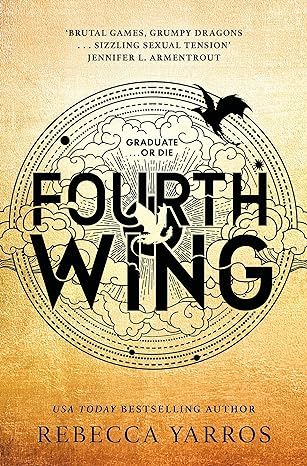
Fourth Wing (International Edition)
4.8
-
206,495
$7.95
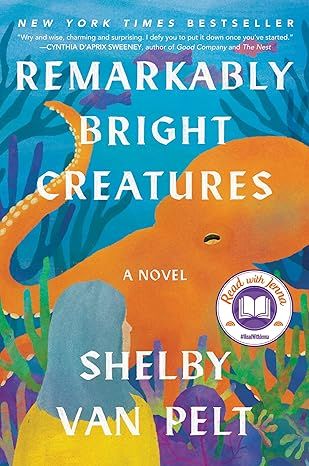
Remarkably Bright Creatures: A Read with Jenna Pick
4.6
-
65,556
$15.80
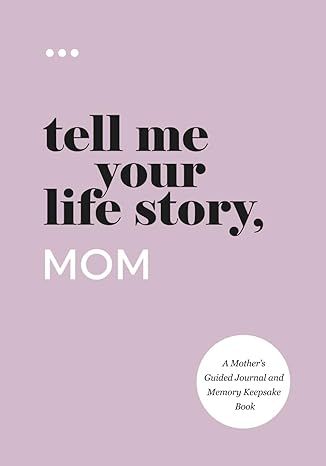
Tell Me Your Life Story, Mom: A Mother’s Guided Journal and Memory Keepsake Book (Tell Me Your Life Story® Series Books)
4.7
-
5,107
$11.24
